课程与教学论期末考试题
《课程与教学论》期末复习综合练习题
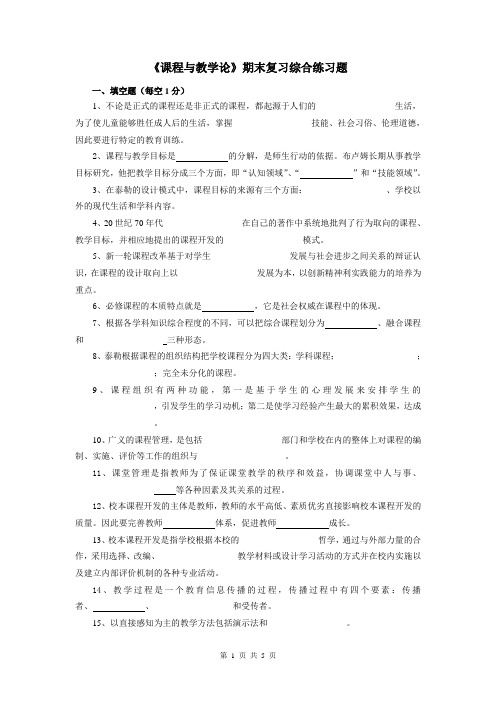
《课程与教学论》期末复习综合练习题一、填空题(每空1分)1、不论是正式的课程还是非正式的课程,都起源于人们的__________________生活,为了使儿童能够胜任成人后的生活,掌握__________________技能、社会习俗、伦理道德,因此要进行特定的教育训练。
2、课程与教学目标是的分解,是师生行动的依据。
布卢姆长期从事教学目标研究,他把教学目标分成三个方面,即“认知领域”、“”和“技能领域”。
3、在泰勒的设计模式中,课程目标的来源有三个方面:__________________、学校以外的现代生活和学科内容。
4、20世纪70年代__________________在自己的著作中系统地批判了行为取向的课程、教学目标,并相应地提出的课程开发的__________________模式。
5、新一轮课程改革基于对学生__________________发展与社会进步之间关系的辩证认识,在课程的设计取向上以__________________发展为本,以创新精神利实践能力的培养为重点。
6、必修课程的本质特点就是,它是社会权威在课程中的体现。
7、根据各学科知识综合程度的不同,可以把综合课程划分为、融合课程和__________________三种形态。
8、泰勒根据课程的组织结构把学校课程分为四大类:学科课程;__________________;__________________;完全未分化的课程。
9、课程组织有两种功能,第一是基于学生的心理发展来安排学生的__________________,引发学生的学习动机;第二是使学习经验产生最大的累积效果,达成__________________。
10、广义的课程管理,是包括__________________部门和学校在内的整体上对课程的编制、实施、评价等工作的组织与__________________。
11、课堂管理是指教师为了保证课堂教学的秩序和效益,协调课堂中人与事、__________________等各种因素及其关系的过程。
课程与教学论试卷及答案3套

课程与教学论试题(一)及答案一、单项选择题(本大题共10小题,每小题2分,共20分)1.把教学过程分为明了、联想、系统、方法四个阶段的教育家是( )A.杜威B.洛克C.凯洛夫D.赫尔巴特2.( )是指向于特定课程与教学目标、受特定课程内容所制约、为师生所共同遵循的教与学的操作规范和步骤。
A.教学过程B.教学原则C.教学方法D.教学设计3.“精神助产术”的确立者是()A.苏格拉底B.亚里士多德C.柏拉图D.黑格尔4.被誉为“现代课程理论的圣经”的著作是(《》)。
A.课程B.课程编制C.课程与教学的基本原理D.怎样编制课程5.五六十年代出现了所谓的“三大新教学论流派”,( )是其中之一。
A.行为主义教学论B.人本主义教学论C.尝试教学论D.发展性教学论6.杜威实现课程与教学一体化的具体途径是( )A.从做中学B.反省思维C.主动作业D.问题教学7.被看作是课程开发的经典模式、传统模式的是( )A.情境模式B.目标模式C.批判模式D.过程模式8.范例教学的三个基本特性是( )A.基本性、基础性、范例性B.基本性、全面性、范例性C.个体性、基础性、范例性D.全员性、基本性、范例性9.“非指导性教学”的教育目的是使学生( )A.一般发展B.自我实现C.全面发展D.情感发展10.( )是具体体现在课程开发与教学设计中的教育价值。
A.教育目的B.教育目标C.课程与教学目标D.课时目标二、填空题(本大题共10个空,每小题2分,共20分)1.()中的()可以说是我国乃至世界最早的教育学专著,系统地总结了我国先秦时期的教育思想与教育经验。
2.()标志着教学论作为一门学科的诞生。
3.古希腊教育包括斯巴达()教育和雅典的()教育。
4.()是世界教育史上第一位对发现学习从理论上进行详细研究、周密论证的教育学家。
5.5.博比特的()问世标志着课程作为一门研究领域的诞生。
6.课程评价主要包括三个方面:()()()。
三、简答题(本大题共5道题,每小题5分,共25分)1. 课程与教学论的学习意义。
课程与教学论期末考试
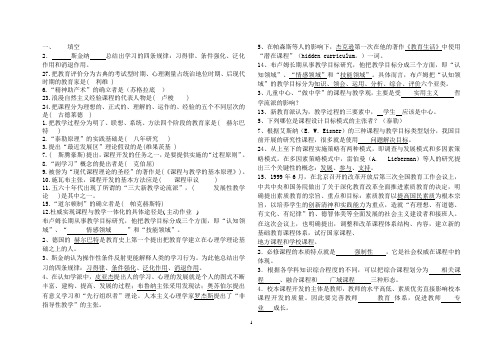
一、填空2.斯金纳总结出学习的四条规律:习得律、条件强化、泛化作用和消退作用。
27.把教育评价分为古典的考试型时期、心理测量占统治地位时期、后现代时期的教育家是( 利维 )6.“精神助产术”的确立者是(苏格拉底)23.浪漫自然主义经验课程的代表人物是( 卢梭 )24.把课程分为理想的、正式的、理解的、运作的、经验的五个不同层次的是( 古德莱德 )1.把教学过程分为明了、联想、系统、方法四个阶段的教育家是( 赫尔巴特 )2.“泰勒原理”的实践基础是( 八年研究 )3.提出“最近发展区”理论假设的是(维果茨基 )7.( 斯腾豪斯)提出,课程开发的任务之一,是要提供实施的“过程原则”。
8.“副学习”概念的提出者是( 克伯屈)9.被誉为“现代课程理论的圣经”的著作是(《课程与教学的基本原理》)。
10.施瓦布主张,课程开发的基本方法应是( 课程审议 )11.五六十年代出现了所谓的“三大新教学论流派”,( 发展性教学论 )是其中之一。
15.“道尔顿制”的确立者是( 帕克赫斯特)12.杜威实现课程与教学一体化的具体途径是( 主动作业)布卢姆长期从事教学目标研究,他把教学目标分成三个方面,即“认知领域”、“情感领域”和“技能领域”。
2、德国的赫尔巴特是教育史上第一个提出把教育学建立在心理学理论基础之上的人。
3、斯金纳认为操作性条件反射更能解释人类的学习行为。
为此他总结出学习的四条规律:习得律、条件强化、泛化作用、消退作用。
4、在认知学派中,皮亚杰提出人的学习、心理的发展就是个人的图式不断丰富、建构、提高、发展的过程;布鲁纳主张采用发现法;奥苏伯尔提出有意义学习和“先行组织者”理论。
人本主义心理学家罗杰斯提出了“非指导性教学”的主张。
5、在帕森斯等人的影响下,杰克逊第一次在他的著作《教育生活》中使用“潜在课程”(hidden curriculum。
)一词。
14、布卢姆长期从事教学目标研究,他把教学目标分成三个方面,即“认知领域”、“情感领域”和“技能领域”。
成人教育《课程与教学论》期末考试复习题及参考答案
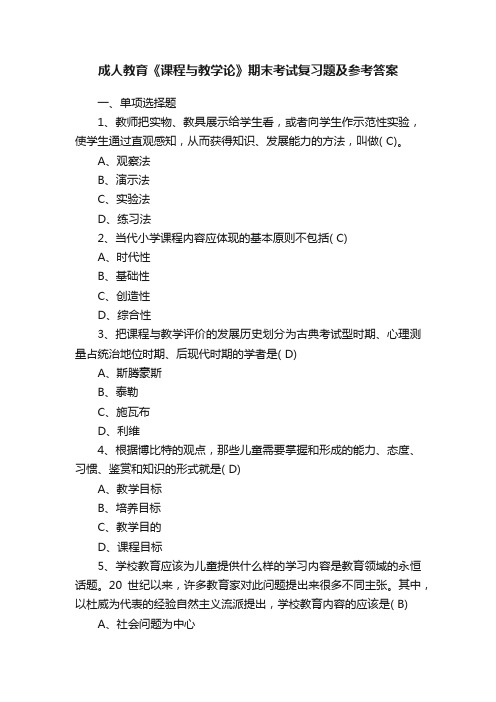
成人教育《课程与教学论》期末考试复习题及参考答案一、单项选择题1、教师把实物、教具展示给学生看,或者向学生作示范性实验,使学生通过直观感知,从而获得知识、发展能力的方法,叫做( C)。
A、观察法B、演示法C、实验法D、练习法2、当代小学课程内容应体现的基本原则不包括( C)A、时代性B、基础性C、创造性D、综合性3、把课程与教学评价的发展历史划分为古典考试型时期、心理测量占统治地位时期、后现代时期的学者是( D)A、斯腾豪斯B、泰勒C、施瓦布D、利维4、根据博比特的观点,那些儿童需要掌握和形成的能力、态度、习惯、鉴赏和知识的形式就是( D)A、教学目标B、培养目标C、教学目的D、课程目标5、学校教育应该为儿童提供什么样的学习内容是教育领域的永恒话题。
20世纪以来,许多教育家对此问题提出来很多不同主张。
其中,以杜威为代表的经验自然主义流派提出,学校教育内容的应该是( B)A、社会问题为中心B、经验为核心C、“文化要素”D、有理智训练价值的永恒学科6、课程目标的形式取向不包括( D)A、行为性目标B、普遍性目标C、生成性目标D、习惯性目标7、现代教学的基本组织形式是( D)A、现场教学B、班级授课C、分组教学D、个别教学8、“不陵节而施”就是强调要按(A )组织课程内容。
A、横向B、水平C、直线D、序列9、形式性评价与总结性评价的提出者是( A)A、斯克里文B、泰勒C、布卢姆D、艾斯纳10、20 世纪,独立于教学论的课程论知识体系形成,课程理论成了一门独立的教育学分支学科。
在这个时期,一批专门的课程研究著作出现,其中美国教育家波比特发表的著作是(B )A、《教育过程》B、《课程论》C、《儿童与课程》D、《教学与发展》11、课程与教学论的研究任务是(D )A、现象·问题和规律B、揭示规律、确立价值、优化技术C、揭示课程论与教学论规律D、研究课程问题和教学问题12、第一次明确提出“把心理发展的研究作为教学总原则的基础”的教育家是( D)A、夸美纽斯B、裴斯泰洛齐C、康德D、赫尔巴特13、( B)认为,课程就是儿童自己组织的一系列活动。
课程与教学论期末考试A卷及答案
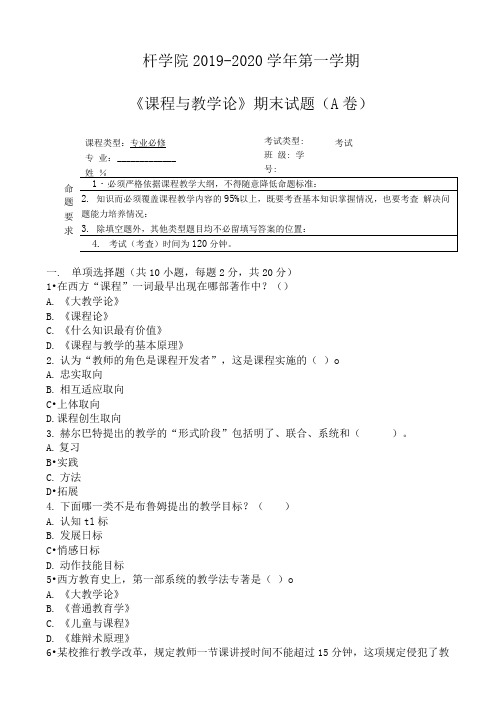
杆学院2019-2020学年第一学期《课程与教学论》期末试题(A 卷)一. 单项选择题(共10小题,每题2分,共20分)1•在西方“课程”一词最早出现在哪部著作中?()A. 《大教学论》B. 《课程论》C. 《什么知识最有价值》D. 《课程与教学的基本原理》2. 认为“教师的角色是课程开发者”,这是课程实施的( )oA. 忠实取向B. 相互适应取向C •上体取向D.课程创生取向3. 赫尔巴特提出的教学的“形式阶段”包括明了、联合、系统和( )。
A. 复习B •实践C. 方法D •拓展4. 下面哪一类不是布鲁姆提出的教学目标?( ) A. 认知tl 标B. 发展日标C •悄感日标D. 动作技能目标5•西方教育史上,第一部系统的教学法专著是( )oA. 《大教学论》B. 《普通教育学》C. 《儿童与课程》D. 《雄辩术原理》6•某校推行教学改革,规定教师一节课讲授时间不能超过15分钟,这项规定侵犯了教 课程类型:专业必修专 业: _____________ 考试类型: 班 级: 学 号: 考试命题 要 求师的()oA.教育教学权B.管理与指导学生权C.评价学生权D.参与学校管理权7•被誉为“现代课程理论之父”的是()oA.博比特B•特斯C.泰勒D•泰罗&“给学生一篇文章,学生在五分钟内不黑帮助或参考书,能够识别出它的风格。
”这种教学目标的表述属于()oA•行为目标B.普遍性13标C•生成性目标D.表现性目标9.课程开发以学科知识及其发展为基点、强调学科知识的优先性,此种课程观是A.儿童中心课程B.社会中心课程C.学科中心课程D.经验中心课程10•根据皮亚杰的道德发展阶段论,当儿童开始有了规则意识,并且认为规则制定属于年长者的专利,这时的儿童处于道德发展的哪一阶段?()A.前道德阶段B.权威阶段C.自律或合作阶段D.公正道德阶段二、多选题(共5小题,每题3分,共15分,多选.错选、少选均不得分)1•关于课程论与教学论的关系,国外的主要观点有()oA.两者相互独立B.两者相互包含C.两者相互交义D.两者循环联系2•课程与教学论的基本任务有()oA.认识课程与教学现象B•解释课程与教学规律C.指导课程与教学实践D.整理课程与教学经验3•倡导综合课程的基本依据是()oA•文化或学科知识的发展不是相互隔离、彼此封闭的,而是相互作用、彼此关联的。
《课程与教学论》期末考试试题及参考答案
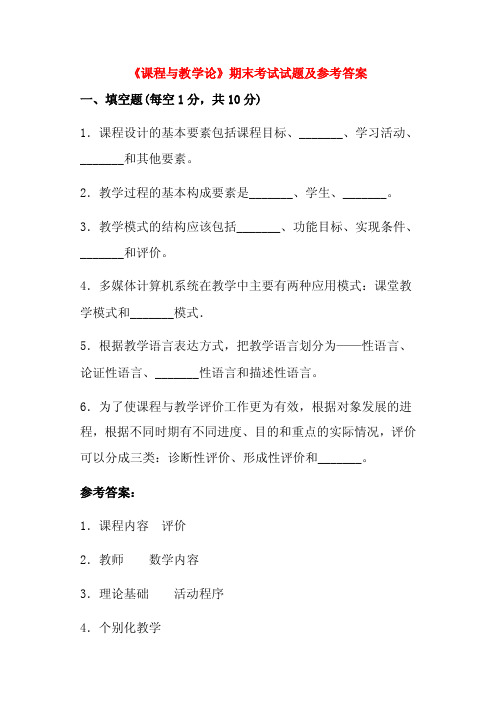
《课程与教学论》期末考试试题及参考答案一、填空题(每空1分,共10分)1.课程设计的基本要素包括课程目标、_______、学习活动、_______和其他要素。
2.教学过程的基本构成要素是_______、学生、_______。
3.教学模式的结构应该包括_______、功能目标、实现条件、_______和评价。
4.多媒体计算机系统在教学中主要有两种应用模式:课堂教学模式和_______模式.5.根据教学语言表达方式,把教学语言划分为——性语言、论证性语言、_______性语言和描述性语言。
6.为了使课程与教学评价工作更为有效,根据对象发展的进程,根据不同时期有不同进度、目的和重点的实际情况,评价可以分成三类:诊断性评价、形成性评价和_______。
参考答案:1.课程内容评价2.教师数学内容3.理论基础活动程序4.个别化教学5.叙述说明6.终结性评价二、判断题(每小题2分,共lo分。
在每小题后面的括号内,根据自己的判断填上“正”或“误’)1.教学过程就是教师教学生学的过程。
( )2.课程内容的选择要考虑内容本身的性质。
( )3.板书的艺术特点之一是要具有示范性。
( )4.学术理性主义取向课程注重教学的内容,强调传统文化的传递与继承,通常以逻辑组织严密的分科课程的面貌出现。
( )5.课程与教学评价的对象主要是对教师的评价.( )参考答案:1.错2.对3.对4.对5.错三、简答题(每小题10分,共40分)1.什么是教学?2.简述情境一陶冶教学模式的内涵。
3:什么是螺旋式课程组织?4.简述课堂教学评价的含义。
参考答案:1.教学:从广义上讲,教学是指教者指导学习者进行的一切有目的的学习活动。
从狭义上讲,教学是指在学校中,教师引导学生进行的学习活动。
2.情境一陶冶教学模式:是指在教学活动中创设一种情感和认知相结合的教学环节,让学生在轻松愉快的教学气氛中获得知识,同时得到情感陶冶的一种教学模式。
3.螺旋式课程组织:是指根据某一学科知识结构的“概念结构”.配合学生的“认知结构”,以促进学生认知能力发展为目的的一种课程发展与设计。
《课程与教学论》期末复习题

《课程与教学论》期末复习题《课程与教学论》期末复习题期末复习提纲一、解释概念课程、课程内容、课程计划、隐性课程、学科课程、综合课程、校本课程、教育方针、课程目标、普遍性目标、行为性目标、教学模式、问题解决模式、自主探究教学模式、研究性教学模式、讲授法、读书指导法、发现学习、程序教学、计算机辅助教学、教学手段、教学组织形式、班级授课制、开放教学、教学评价、形成性评价、质性评价、表现性测验、教学设计、课堂教学管理二、选择题1(下列不属于潜在课程功能的是( )。
A( 激励功能 B( 情感愉悦功能C( 个体素质发展功能 D(社会价值观的导向功能2(“指向教育的总体方向,体现的是普遍的、总体的、终极的教育价值”,这是指( )。
A(课程与教学目标B(教育目标C(教育目的 D(培养目标3(教育目标具有层次结构;教育目标要以学生具体的、外显的行为来陈述;教育目标超越了学科内容。
这三个典型特征是属于( )。
A(布卢姆等人的“教育目标分类学”的特征B(艾斯纳的表现性目标的特征C(斯腾豪斯等人的生成性目标的特征D(传统的普遍性目标的特征4. 以下不属于一般教学目标编写的表达方式的是( )。
A.行为目标B.发展目标C.表现目标D. 内部心理与外显行为相结合的目标5(行为目标具有的特点是具体性、可操作性和( )。
A.普遍性B.精确性C.规范性D.模糊性6.赫尔巴特提出的教学过程的“形式阶段”包括明了、联合、系统和( )。
A.复习 B.实践C.方法D.拓展7(“教学设计是一个连续创造的过程,指向于人的解放”,教学设计的这种特征反映的课程实施取向是( )。
A(忠实取向B(相互适应取向C(课程创生取向D(实践取向8. ( )是一种以实际训练为主的教学方法,其主要价值在于形成和发展学生的技能和技巧。
A. 演示法B. 研究法C. 谈话法D. 练习法 9(尝试教学法是我国( )提出的教学方法改革。
A.卢仲衡B.魏书生C.黎世法D.邱学华10(在非指导性教学中,教师的身份是( )。
《课程与教学论》期末考试题
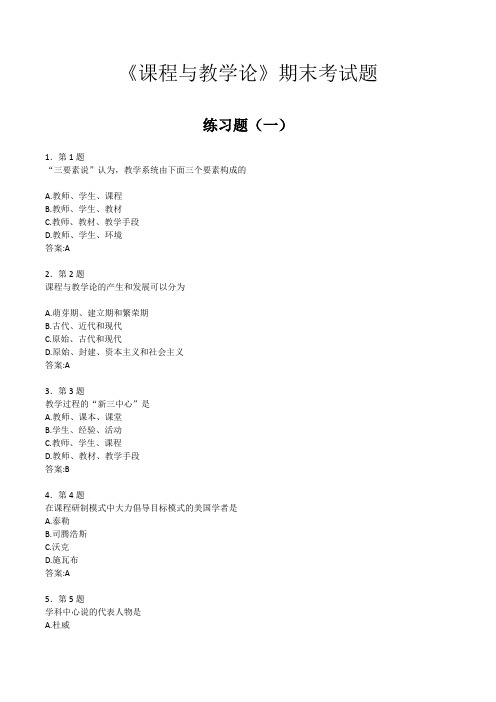
《课程与教学论》期末考试题练习题(一)1.第1题“三要素说”认为,教学系统由下面三个要素构成的A.教师、学生、课程B.教师、学生、教材C.教师、教材、教学手段D.教师、学生、环境答案:A2.第2题课程与教学论的产生和发展可以分为A.萌芽期、建立期和繁荣期B.古代、近代和现代C.原始、古代和现代D.原始、封建、资本主义和社会主义答案:A3.第3题教学过程的“新三中心”是A.教师、课本、课堂B.学生、经验、活动C.教师、学生、课程D.教师、教材、教学手段答案:B4.第4题在课程研制模式中大力倡导目标模式的美国学者是A.泰勒B.司腾浩斯C.沃克D.施瓦布答案:A5.第5题学科中心说的代表人物是A.杜威B.赫尔巴特C.施瓦布D.夸美纽斯答案:C6.第6题下列课程设计模式中,属于问题中心课程设计模式的是A.学科设计B.生活领域设计C.科目设计D.学习者中心设计答案:B7.第7题在某一教学思想和原理的指导下,围绕某一主题,为实现教学目标而形成的相对稳定的规范化教学程序和操作体系就是A.教学内容B.教学模式C.教学形式D.教学方法答案:B8.第15题在学完某门课程或某个重要部分之后进行的旨在评价学生是否已经达到教学目标要求的概括水平较高的测试和成绩评定是A.终结性评价B.形成性评价C.诊断性评价D.相对性评价答案:A9.第16题现代教学的基本组织形式是A.现场教学B.个别教学C.分组教学D.班级授课答案:D10.第17题17世纪,《大教学论》,这本被认为是历史上专门而系统研究和阐述教育问题的专门著作问世,一般人将这本专著的发表看作是教学论诞生的标志。
这本著作的作者是A.昆体良B.夸美纽斯C.裴斯泰洛齐D.赫尔巴特答案:B11.第18题认为课程与教学必须重视学科结构、直觉思维和发现学习的学者是A.杜威B.赫尔巴特C.布鲁纳D.罗杰斯答案:C12.第19题在课程与教学论发展的萌芽时期,产生了一批论述课程与教学问题的专著,其中,世界上已发现的最早的课程与教学论专著是A.《理想国》B.《论语》C.《学记》D.《雄辩术原理》答案:C13.第27题在课程研制中以价值判断和选择为核心的、对理论指导、目标、内容或经验、组织与结构、活动样式或策略、评价等多种可能性和方案进行选择、确定和应用的过程被称为A.课程决策B.课程开发C.课程实施D.课程评价答案:A14.第28题在评价对象群体之外,预定一个客观的或者理想的标准,并运用这个固定的标准去评价每个评价对象的评价类型是A.绝对评价B.相对评价C.他评价D.元评价答案:A15.第29题典型的自学辅导式的教学组织形式是A.班级授课B.个别教学C.道尔顿制D.分组教学答案:C16.第30题“四要素说”认为,构成教学系统的四个要素是A.教师、学生、课程和物质条件B.教师、学生、教材和媒体C.教师、教材、教学手段和目的D.教师、学生、环境和反馈答案:A17.第8题关于课程与教学论的关系问题,西方课程与教学研究领域主要______________、______________、____________和二元循环联系模式等四种不同主张。
《小学课程与教学论》期末考试试卷附答案

《小学课程与教学论》期末考试试卷附答案一、选择题(本大题共10小题,每小题4分,共40分)1.在学习过程中,应充分发挥思维活动的作用,多方面展开()等思维活动,从而在有效思考和理解的基础下接受知识。
①分析②对比③归纳④概括⑤抽象⑥质疑⑦猜想A.①②③④ B. ①②③④⑤ C .①②③④⑤⑥ D .①②③④⑤⑥⑦2.“现代教学论”是以()谁的教学论为代表的。
A.赫尔巴特 B.斯金纳 C.布鲁纳 D.杜威3.赫尔巴特教学理论体系完整,有鲜明的学科建设意图,影响巨大,学术界常把()作为教育学和教育学论学科发展成熟的基本标志。
A.《教育学》 B.《大教育学》 C.《大教学论》 D.《普通教育学》4.课程就是指教学的内容及其()的安排。
A.学科B.进程C.科目D.知识5.教学内容是课程的()组成部分。
A.基本B.主要C.重要D次要6.课程标准就是指()课程标准。
A.学科B.科目C.教学D.知识7.学科强调的是()。
A.分科的形式B.知识的内容C. 知识的分类D.分科的内容8.世界上最早的课程()A隐性课程 B.综合课程 C.活动课程和能力课程 D.社会生活和生产劳动9我国古代学校课程()A七艺 B.四经五书 C.三百千千 D.三千千千10、学习者的需要、当代社会生活需求和-----是确立课程目标的依据。
()A人的发展B学科的发展 C教材的编制D课程标准的要求二、名词解释题(本大题共2小题,每小题10分,共20分)1.优化教学2.教学手段三、简答题(本大题共4小题,每小题10分,共40分)1、小学常用的教学方法?2、优化教学的一般标准?3、教学模式的结构?4、教学模式的发展趋势?小学课程与教学论参考答案:一、选择题1-10 D D D B C A B D C B二、名词解释题1.优化教学是指通过改革创新而达到的教学的最佳状态。
2.教学手段是师生教学相互传递信息的工具、媒体或设备。
三、简答题1、答:讲授法:谈话法:讨论法:实验法;实习作业法;练习法;参观法2、答:(一)最优化不是片面的(二)最优化具体条件下的最优化(三)最优化是教师工作的一项特殊原则(四)最优化要实现最佳的结果3、答:教学理论、教学目标、教学内容、师生组合、操作程序等五个因素互相联系,构成完整的教学模式。
年电大《课程和教学论》期末考试试题资料简答题46题附全答案

年电大《课程和教学论》期末考试试题资料简答题46题附全答案2、怎样从静态的角度理解课程?当我们从静态的角度理解课程时,能够说课程是目标、是学科或教材、是计划。
这时,课程和教学既有本质上的区别,又有实践上的联系。
教学作为课程实施的有效途径,是一种动态的活动过程。
3、简述文化传统、社会制约课程和教学的维度。
从宏观上,四个社会系统要素制约着课程和教学的发展水平。
从微观上,制约着课堂教学的组织和人际关系。
具体包含社会系统要素制约教师对课程的理解和组织、制约着学生对课程的理解和选择,师生各自的意识影响课堂上的人际交往。
4、简述设计课程和教学目标的意义。
第一,为课程内容和方法的选择提供依据。
第二,为课程和教学的组织提供依据。
第三,为课程实施提供依据。
第四,为课程和教学的评价提供依据。
5、简述课程和教学的理论基础。
课程和教学的理论基础是确定课程和教学目标、选择课程和教学内容、运用教学方法和评价方法的依据。
课程和教学研究本质上是探索有利于学生发展的目标、内容和方法,认识课程和教学的规律和特点。
研究课程和教学的理论基础通常需要考虑三个方面的问题,即课程和教学的心理学基础、课程和教学的哲学基础、课程和教学的社会和文化学基础。
6、简述分科课程和综合课程的类型特点及其适用性。
分科课程:定义,即学科课程,它是依据学校的教育目标、教学规律和一定年龄阶段的学生发展水平,分别从各门学科中选择部分内容,组成不同的学科,彼此分立地安排它们的教学顺序、教学时数和期限。
分科课程强调各门课程各自的逻辑体系,教学以各个学科知识为中心分科进行,分科课程重视每门学科知识体系的科学安排。
优点:有助于教学科目的设计和管理,也易于教师的教学,同时更有利于学生简捷有效地获取系统的知识,形成一定的知识体系。
正因为如此,分科课程在古今中外的教育发展中一直居于重要位置。
缺陷:第一,导致学科数量的无限膨胀。
第二,限制了学生的视野,束缚了学生的思维广度。
第三,忽视学生的兴趣和需要。
课程与教学论期末考试题库
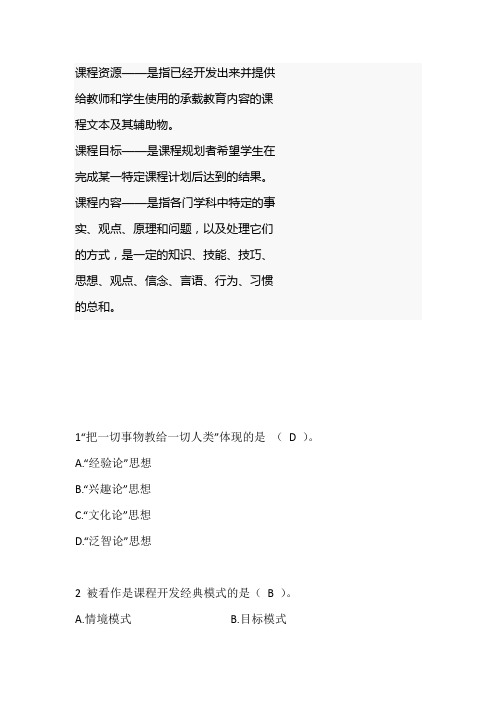
课程资源——是指已经开发出来并提供给教师和学生使用的承载教育内容的课程文本及其辅助物。
课程目标——是课程规划者希望学生在完成某一特定课程计划后达到的结果。
课程内容——是指各门学科中特定的事实、观点、原理和问题,以及处理它们的方式,是一定的知识、技能、技巧、思想、观点、信念、言语、行为、习惯的总和。
1“把一切事物教给一切人类”体现的是(D )。
A.“经验论”思想B.“兴趣论”思想C.“文化论”思想D.“泛智论”思想2 被看作是课程开发经典模式的是(B )。
A.情境模式B.目标模式C.批判模式D.过程模式3 在泰勒看来,课程开发的起点是(A )。
A.确定教育目标B.选择教育经验C.组织教育经验D.评价教育计划4“道尔顿制”的确立者是(C )。
A.巴班斯基B.布卢姆C.帕克赫斯特D.瓦根舍因5“什么知识最有价值”的提出者是(A )。
A.斯宾塞B.吉鲁C.阿普尔D.威利斯6“教学过程是教师与学生以课堂为主渠道的交往过程”,这一命题对师生关系的正确理解是(D )。
A.教师主体学生客体的关系B.学生主体教师客体的关系C.教师主导学生主体的关系D.教师与学生是交互主体的关系7 在非指导性教学中,教师的身份是(C )。
A.先知者B.管理者C.促进者D.指导者8 生成性目标取向追求的是(D )。
A.普遍主义B.唯科学主义C.实践理性D.解放理性9 法国著名思想家卢梭的旷世教育名著是(A )。
A.《爱弥儿》B.《爱的教育》C.《教育漫话》D.《理想国》10 生成性目标是在教育情境之中随着教育过程展开而自然生成的课程与教学目标。
其渊源可以上溯到杜威“教育即生长”的命题以及英国著名课程论专家斯腾豪斯的( B )。
A 目标模式B 过程模式C 实践模式D 解放模式11 被誉为“现代课程理论的圣经”的著作是(C )。
A.课程B.课程编制C.课程与教学的基本原理D.怎样编制课程12 浪漫自然主义经验课程论的代表人物是(B )。
课程与教学论考试试题(精品文档)_共10页
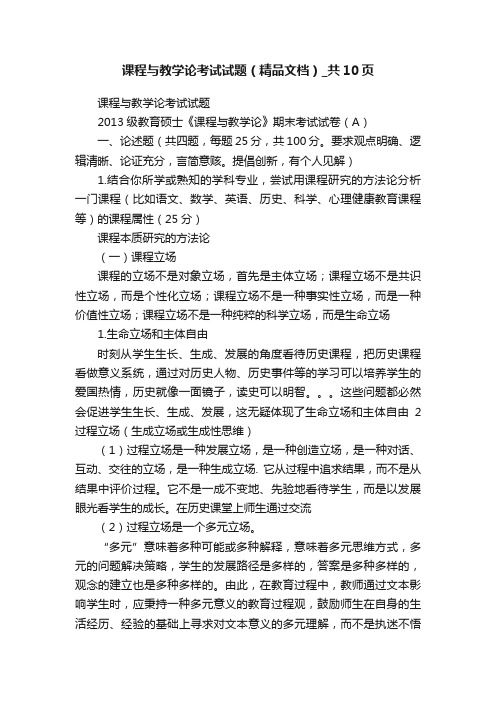
课程与教学论考试试题(精品文档)_共10页课程与教学论考试试题2013级教育硕士《课程与教学论》期末考试试卷(A)一、论述题(共四题,每题25分,共100分。
要求观点明确、逻辑清晰、论证充分,言简意赅。
提倡创新,有个人见解)1.结合你所学或熟知的学科专业,尝试用课程研究的方法论分析一门课程(比如语文、数学、英语、历史、科学、心理健康教育课程等)的课程属性(25分)课程本质研究的方法论(一)课程立场课程的立场不是对象立场,首先是主体立场;课程立场不是共识性立场,而是个性化立场;课程立场不是一种事实性立场,而是一种价值性立场;课程立场不是一种纯粹的科学立场,而是生命立场1.生命立场和主体自由时刻从学生生长、生成、发展的角度看待历史课程,把历史课程看做意义系统,通过对历史人物、历史事件等的学习可以培养学生的爱国热情,历史就像一面镜子,读史可以明智。
这些问题都必然会促进学生生长、生成、发展,这无疑体现了生命立场和主体自由2过程立场(生成立场或生成性思维)(1)过程立场是一种发展立场,是一种创造立场,是一种对话、互动、交往的立场,是一种生成立场. 它从过程中追求结果,而不是从结果中评价过程。
它不是一成不变地、先验地看待学生,而是以发展眼光看学生的成长。
在历史课堂上师生通过交流(2)过程立场是一个多元立场。
“多元”意味着多种可能或多种解释,意味着多元思维方式,多元的问题解决策略,学生的发展路径是多样的,答案是多种多样的,观念的建立也是多种多样的。
由此,在教育过程中,教师通过文本影响学生时,应秉持一种多元意义的教育过程观,鼓励师生在自身的生活经历、经验的基础上寻求对文本意义的多元理解,而不是执迷不悟于所谓的标准答案和确定性结论,允许“多元”的声音存在。
3)过程思维是要揭示过程中的复杂动态的关系和动态平衡的状态。
——揭示教育过程的关联性。
(1)与自身的联系。
(2)与社会和文化的联系。
(3)与自然的联系。
——揭示教育过程的转化与生成。
《课程与教学论》期末作业
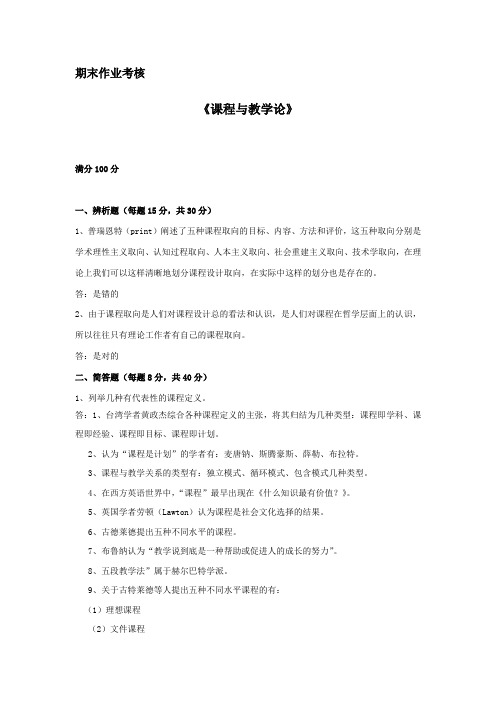
期末作业考核《课程与教学论》满分100分一、辨析题(每题15分,共30分)1、普瑞恩特(print)阐述了五种课程取向的目标、内容、方法和评价,这五种取向分别是学术理性主义取向、认知过程取向、人本主义取向、社会重建主义取向、技术学取向,在理论上我们可以这样清晰地划分课程设计取向,在实际中这样的划分也是存在的。
答:是错的2、由于课程取向是人们对课程设计总的看法和认识,是人们对课程在哲学层面上的认识,所以往往只有理论工作者有自己的课程取向。
答:是对的二、简答题(每题8分,共40分)1、列举几种有代表性的课程定义。
答:1、台湾学者黄政杰综合各种课程定义的主张,将其归结为几种类型:课程即学科、课程即经验、课程即目标、课程即计划。
2、认为“课程是计划”的学者有:麦唐钠、斯腾豪斯、薛勒、布拉特。
3、课程与教学关系的类型有:独立模式、循环模式、包含模式几种类型。
4、在西方英语世界中,“课程”最早出现在《什么知识最有价值?》。
5、英国学者劳顿(Lawton)认为课程是社会文化选择的结果。
6、古德莱德提出五种不同水平的课程。
7、布鲁纳认为“教学说到底是一种帮助或促进人的成长的努力”。
8、五段教学法”属于赫尔巴特学派。
9、关于古特莱德等人提出五种不同水平课程的有:(1)理想课程(2)文件课程(3)实施课程(4)理解课程(5)经验课程2、简述赫尔巴特教学阶段论。
答:赫尔巴特根据其统觉思想,把教学过程分成四个阶段,即四段教学法:1.明了:给学生明确地讲授新知识;2.联想:新知识要与旧知识建立联系;3.系统:作出概括和结论;4.方法:把所学知识应用于实际(习题解答、书面作业等)。
同这四个阶段相应的学生的心理状态是:注意、期待、探究和行动。
3、我们从国外的课程改革中取得了哪些启示?《基础教育课程改革纲要(试行)》中明确指出:“改变课程实施过于强调接受学习,死记硬背、机械训练的现状,倡导学生主动参与,乐于探究,勤于动手,培养学生搜集和处理信息的能力,获取新知识的能力,分析和解决问题的能力以及交流与合作的能力。
课程与教学论期末考试B卷及答案

课程与教学论期末考试B卷及答案**学院2019-2020学年第一学期《课程与教学论》期末试题(B卷)课程类型:专业必修考试类型:考试专业:班级:姓名:学号:一、单项选择题(共10小题,每题2分,共20分)1.作为教学论学科发展成熟基本标志的著作是()。
A.《大教学论》B.《普通教育学》C.《学记》D.《雄辩术原理》2.下列哪部著作被西方社会认为是“课程论”诞生的标志。
()A.《课程论》B.《课程的基础、原理与问题》C.《儿童与课程》D.《理解课程》3.根据布鲁姆教育目标分类学框架,下面认知目标中属于最高层次的是()。
A.口头解释几何概念后,学生能画出相应的几何图形B.面对一份污染报告,学生能提出检验其中结论的方法C.学生能推测出容器中的空气抽出后对容器产生什么样的影响D.学生阅读文章时,能区分出观点和事实4.赫尔巴特提出的教学的四个“形式阶段”具体是()。
A.专心审思练习巩固B.预习学习练习复习C.预习练习实践巩固D.明了联合系统方法5.为了使学生加强保护环境的意识,许多学校开设了“环境教育课程”,这种课程属于()。
A.学科本位综合课程B.社会本位综合课程C.儿童本位综合课程D.成人本位综合课程6.师生关系中最基础的关系是()。
A.业务关系B.伦理关系C.情感关系D.管理关系7.现代教学论所说的“三中心”不包括 ( )。
A.活动中心B.经验中心C.社会中心D.儿童中心8.把课程分为理想的、正式的、理解的、运作的、经验的五个不同层次的是( )。
A.古德莱德B.查特斯C.斯金纳D.杜威9.主张由学生自己发现问题、解决问题的教学方法是()。
A.读书指导法B.发现法C.暗示法D.实习法10.“儿童中心主义”教育思想的集大成者是美国教育家()。
A .裴斯泰洛齐B. 卢梭C. 福禄倍尔D. 杜威二、多选题(共5小题,每题3分,共15分,多选、错选、少选均不得分)1.课程与教学关系中,“包含模式”的情形有()。
《课程与教学论》期末试卷A
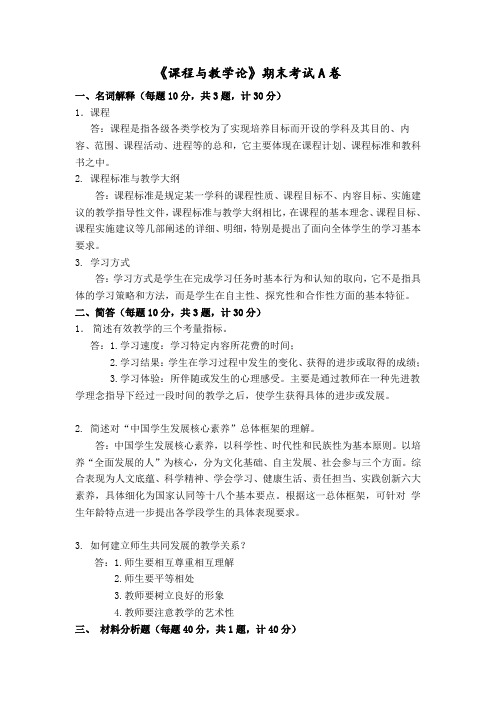
《课程与教学论》期末考试A卷一、名词解释(每题10分,共3题,计30分)1.课程答:课程是指各级各类学校为了实现培养目标而开设的学科及其目的、内容、范围、课程活动、进程等的总和,它主要体现在课程计划、课程标准和教科书之中。
2. 课程标准与教学大纲答:课程标准是规定某一学科的课程性质、课程目标不、内容目标、实施建议的教学指导性文件,课程标准与教学大纲相比,在课程的基本理念、课程目标、课程实施建议等几部阐述的详细、明细,特别是提出了面向全体学生的学习基本要求。
3. 学习方式答:学习方式是学生在完成学习任务时基本行为和认知的取向,它不是指具体的学习策略和方法,而是学生在自主性、探究性和合作性方面的基本特征。
二、简答(每题10分,共3题,计30分)1.简述有效教学的三个考量指标。
答:1.学习速度:学习特定内容所花费的时间;2.学习结果:学生在学习过程中发生的变化、获得的进步或取得的成绩;3.学习体验:所伴随或发生的心理感受。
主要是通过教师在一种先进教学理念指导下经过一段时间的教学之后,使学生获得具体的进步或发展。
2. 简述对“中国学生发展核心素养”总体框架的理解。
答:中国学生发展核心素养,以科学性、时代性和民族性为基本原则。
以培养“全面发展的人”为核心,分为文化基础、自主发展、社会参与三个方面。
综合表现为人文底蕴、科学精神、学会学习、健康生活、责任担当、实践创新六大素养,具体细化为国家认同等十八个基本要点。
根据这一总体框架,可针对学生年龄特点进一步提出各学段学生的具体表现要求。
3. 如何建立师生共同发展的教学关系?答:1.师生要相互尊重相互理解2.师生要平等相处3.教师要树立良好的形象4.教师要注意教学的艺术性三、材料分析题(每题40分,共1题,计40分)阅读“第十名现象”,谈谈什么样的教育是成功的教育,什么样的学生是好学生……周武是杭州市天长小学多年的班主任。
在一次学生毕业20周年的聚会中,他惊异地发现,一些业绩较为突出的同学,在小学时期大都是学习成绩不够显眼的学生;相反,当年老师们很喜欢的几个尖子生却大都业绩平平。
最新国家开放大学电大本科《课程与教学论》期末题库及答案

最新国家开放大学电大本科《课程与教学论》期末题库及答案考试说明:本人针对该科精心汇总了历年题库及答案,形成一个完整的题库,并且每年都在更新。
该题库对考生的复习、作业和考试起着非常重要的作用,会给您节省大量的时间。
做考题时,利用本文档中的查找工具,把考题中的关键字输到查找工具的查找内容框内,就可迅速查找到该题答案。
本文库还有其他网核及教学考一体化答案,敬请查看。
《课程与教学论》题库及答案一一、填空(每空l分,共10分)1.辛德等在1992年归纳了三种课程实施取向,它们是—-—、互动调适观和——。
2.所谓教学手段,是指师生为实现预期的教学目的,开展教学活动、相互传递信息的—-—、——或设备。
3.导课的针对性指教师在教学中既要考虑教学-------- 的需要,又要顾及、4.课程设计,指按照一定的教育观念和价值取向,对学校课程的整体------- 以及一门课程的各构成-----进行的规划与安排。
5.自学一指导教学模式是指教学活动以——的——为主,教师的指导贯穿于学生自学始终的教学模式。
二、判断下列说法的对错(每题2分。
共10分)1.“互动理论”认为,学校或课堂是一个由表达一定的社会意义的各种符号所组成的社会环境。
( )2.教学过程就是教师教学生学的过程。
( )3.生成性目标在英国著名课程论专家泰勒的理论中得到了发展和传播。
( )4.除研究法外,讨论法也是一种引导探究为主的教学方法。
( )5.口语化是教学语言艺术的特点之一。
( )三、简答题(每题l0分。
共40分)1.什么是教学?2.什么是螺旋式课程组织?3.简述课程设计的目标模式。
4.简述教学过程的原则。
四、论述题(每题20分。
共40分)1.试比较中央集权型与地方分权型课程管理模式的优点与弊端。
2.结合实践分析当前教学组织形式改革的重点。
试题答案及评分标准一、填空题(每空l分。
共10分)1.忠实观生成观2.工具媒体3.内容学生的特点4.结构要素5.学生自学二、判断题(每题2分,共10分)1.对 2.错 3.错 4.对 5.对三、简答题(每题l0分,共40分)1.’教学:从广义上讲,教学是指教者指导学习者进行的一切有目的的学习活动~从狭义上讲,教学是指在学校中,教师引导学生进行的学习活动。
课程与教学论期末考试题
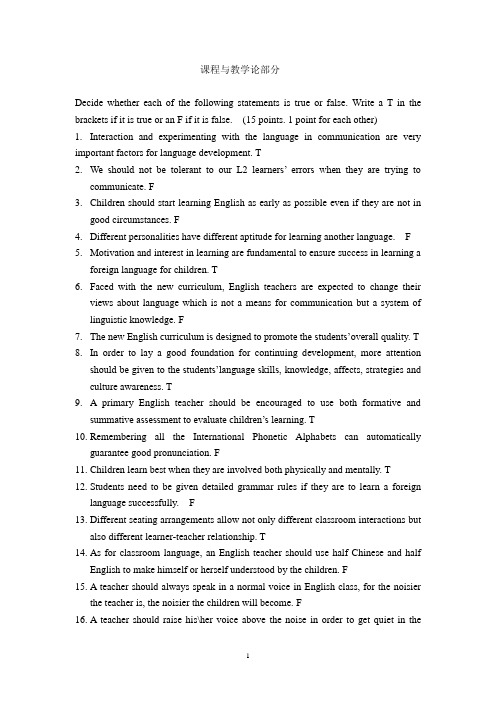
课程与教学论部分Decide whether each of the following statements is true or false. Write a T in the brackets if it is true or an F if it is false. (15 points. 1 point for each other)1.Interaction and experimenting with the language in communication are very important factors for language development. T2.We should not be tolerant to our L2 learners’ errors when they are trying tocommunicate. F3.Children should start learning English as early as possible even if they are not ingood circumstances. F4.Different personalities have different aptitude for learning another language. F5.Motivation and interest in learning are fundamental to ensure success in learning aforeign language for children. T6.Faced with the new curriculum, English teachers are expected to change theirviews about language which is not a means for communication but a system of linguistic knowledge. F7.The new English curriculum is designed to promote the students’overall quality. T8.In order to lay a good foundation for continuing development, more attentionshould be given to the students’language skills, knowledge, affects, strategies and culture awareness. T9. A primary English teacher should be encouraged to use both formative andsummative assessment to evaluate children’s lea rning. T10.Remembering all the International Phonetic Alphabets can automaticallyguarantee good pronunciation. F11.Children learn best when they are involved both physically and mentally. T12.Students need to be given detailed grammar rules if they are to learn a foreignlanguage successfully. F13.Different seating arrangements allow not only different classroom interactions butalso different learner-teacher relationship. T14.As for classroom language, an English teacher should use half Chinese and halfEnglish to make himself or herself understood by the children. F15.A teacher should always speak in a normal voice in English class, for the noisierthe teacher is, the noisier the children will become. F16.A teacher should raise his\her voice above the noise in order to get quiet in theclassroom. F17.A class that is in control is not always quiet and a quiet class with a teacher doingall the talking is not necessarily a good learning environment. T18.Putting summative and formative assessment together, we will be able to form asound basis for checking students’learning and teachers’ teaching. T19.Formative assessment is mainly based on formal testing, which is done mostly atthe end of a learning period or at the end of a school year. F20.By constantly reflecting on teaching and learning, the teacher can move towardsprofessional competence. T21.The method, known as Total Physical Response, means that children respond toteachers’ instructions by using gestures, body language or by speaking loudly. F 22.Children’s attention spa n is very short, thus many long activities are used insteadof short and simple ones. F23.There is no point in explaining complicated grammar rules to children, for theyare not good at analyzing language rules. T24.Children like to do things with difficult learning targets because they want to feelsure that it is not something beyond their ability. F25.One language form may express a number of communicative functions and onecommunicative function cannot be expressed by a variety of language forms. F municative competence entails knowing not only the language code or theform of the language but also knowing how to use the language appropriately in social situations. T27.The English teaching objectives are to develop students overall language abilitieswhich are composed of language knowledge, language skills, affect, learning strategies as well as cross-cultural awareness for relevant levels. T28.It is believed that poor pronunciation may cause problems for the learning of otherskills. T29.Children do not need to learn grammar rules when they acquire their firstlanguage, so they do not need them either when learning a foreign language. F 30.Teaching and learning grammar should focus on practice rather than the study ofgrammar itself. Tnguages consist of “words” with equivalents from one language to another. F32.English-English explanations are the best way for vocabulary teaching. F33.Reading is a silent activity. Reading aloud does not help much withcomprehension. T34.When we read, our eyes should constantly move from letter to letter, word to wordand sentence to sentence. F35.It is helpful to use a dictionary to check and note down the meaning of all the newwords while reading. F36.Possessing a large amount of vocabulary is the key for reading comprehension. F37.It is not necessary to pre-plan the instruction or support the instruction by pictures,demonstrations, or examples. F38.We should expect our students to produce accurate language every time theyspeak. F39.Asking the students to predict or guess the meaning of a word in certain contextbefore explaining it to them is one way to consolidate new words. F40.The main advantage of task-based teaching is that language is used for a genuinepurpose that real communication should take place. T41.Making errors will lead to bad habit formation, so we should correct themwhenever they occur. F42.As a learner of English, you will be forgiven for errors of inappropriateness if youcan speak good English. F43.The English curriculum at the primary phase is designed into 2 levels. Level 1covers Grade 4, Level 2 covers Grade 6. FMultiple choice .Choose from the given choices the correct one and write the corresponding letter in the answer sheet. ( 15points, 1 point for each choice )D 1. Activities can usually “stir ” a class and can also “settle ” it .Which of the following activities is a “stirrer”?A. Ask the whole class to copy a list of food words onto a piece of paper from the board.B. Children open the book and practice the dialogue and ready for an acting out.C. Stick a list of flashcards on the board with number given to each card. Ask thepupils to listen and write down the number of the picture they hear.D. The teacher puts the cards together and takes away one of them and asks thepupils to guess what she has got on her flashcards by saying to the children “guess what I have got on my flashcards”.D 2. Which of the following activities are best done for individual work?A. Story-tellingB. guessing gamesC. information-gap activityD. reading silentlyA 3. Which of the following activities are best done with group work.A. drama performanceB. reading aloudC. writing a letter or e-mailD. presenting new languageC 4. Below is a classroom extract. Which error-correction method is used?A. direct teacher correctionB. whole class correctionC. self-correctionD. peer correctionC 5. The following are things that teachers often do in a language classroom. Decide what role the teacher is playing.A. controllerB. assessorC. prompterD. resource-providerB 6. The following are what teachers often do in a language classroom. Decide what role the teacher is playing.The teacher asks students to produce conversations (either orally or in writing) by using particular patterns or expressions they have just learned.A. assessorB. controllerC. prompterD. participantD 7. The following are what teachers often do in a language classroom. Decide what role the teacher is playing.While doing a writing task either individually or in groups, the students need to use a particular word they don’t know. So they ask the teacher.A. assessorB. prompterC. organiserD. resource-providerA 8. Which of the following activities is best for whole class work ?A. summarizing learningB. performing an information-gap taskC. writing a letter or e-mailD. reading silentlyB 9. Which measure is the most appropriate for the teacher to take if the class seem to be getting out of control, or if discipline occurs due to inappropriacy of the activity?A. stopping the classB. changing the activityC. shouting loudlyD. dealing with it immediatelyD 10. Which of the following ways to solve disciplines problems have proved not useful or effective except ______?A. using threats and shouting loudlyB. giving written homeworkC. putting them in the corridorD. creating a code of behaviorC 11. To develop the skill of listening for gist, which of the following activity should not be included?A. deciding upon a titleB. sequencing the main pointsC. filling in some blanks with the words in the textD. writing a brief summaryB 12. Many proponents of the Communicative Approach advocate the use of ______materials in the language classroom.A. classicB. authenticC. modernD. oralD 13. Single out the statement that can not be classified into the category of thelanguage skills.A. Automatic decoding skillsB. Sufficient amount of vocabularyC. Adequate knowledge of grammarD. Relevant backgroundB 14. Please identify the follow ing students’ reading approach.The reading approach used by Tom is _____.A. top-down approachB. the bottom-up approachC. the interactive approachD. the elective approachC 15. For the production stage in teaching, there is _____.A. no information gap activitiesB .no role play activitiesC. an emphasis on fluency and useD. an emphasis on correctnessA 16. According to the PPP model, which speaking activity in the following wouldmost probably appear at the production stage of the oral class teaching?A. DiscussionB. RepetitionC. Gapped dialogueD. Reading and actingA 17. Which of the following is characteristic of children in learning a foreignlanguage?A. They pay more attention to meaning than to formB. They have a clear purpose in learning a foreign languageC. They can monitor their own learning.D. They can concentrate for a long time in classA 18. Which of the following activities are best done with pair work?A. Information gapB. Guessing gameC. Watching videosD. Role-playD 19. Which of the following helps assess language performances?A. Asking students to reflect on what activities attract them most.B. Asking students about their attitudes towards a certain game.C. Asking students to draw pictures according to description.D. Asking students to do a quiz at the end of the lesson.C 20. Which of the following is suitable for speaking?A. TPR actionsB. Recognizing picturesC. Information gap D .Matching pictures with descriptionsC 21 In which stage of the presentation – practice - production approach will studentshave the chance to use the new language freely and incorporate it into their existing language?A. Presentation stageB. Practice stageC. Production stageD. Presentation and practice stageC 22. What role does a teacher take to create an environment in which learning can take place ?A. InstructorB. PrompterC. ManagerD. AssessorC 23. The following principles except ______ are used for designing activities used in the primary classroom.A. Children learn best when feeling happy and secure.B. Children learn best when they are involved both physically and mentally.C. Children don’t need plenty of opportunities to use similar language again andagain.D. Children learn the whole language rather than through analyzing languagerules.D 24. Mentally-engaged activities require children to think hard while doing them.Which of the following activities belongs to it?A. Reading aloudB. Coping or colouringC. Repeating the sentenceD. Guessing gamesA 25. What is the teacher doing by saying "Now you are going to do this in pairs."?A. Setting up tasks.B. Controlling discipline.C. Demonstrating.D. Getting feedback.A 26. Which role does the teacher play in the following activities?When the students are doing a group-work task, the teacher joins one or two groups for a short period of time.C.participant B. assessorC. source of helpD. controllerB 27. In the process of the PPP model teaching, the amount of the teacher’s controlis expected to ______ as the activities progress from accuracy-focused tofluency-focused.A. increaseB. decreaseC. remainD. loseD 28. What strategy does the following activity help to train reading?Locating the specific information.A. skimmingB. inferringC. word-guessingD. scanningC 29. Which reading skill is the teacher using in reading?The teacher asks the students to try to guess information or ideas that go beyond the literal meaning of the text.B.recognizing organization of the text B. predictingC. inferring or reading between the linesD. scanningA 30. To memorize vocabulary by reading and repeating aloud is______ than to memorize them in context.A. less effectiveB. more effectiveC. much easierD. much quickerC 31. Which of the following can train listening?A. Sequencing the pictures.B. Writing captions for pictures.C. TPR= Total Physical ResponseD. Matching titles with different paragraphs.B 32.The reading approach used by Tom is ______ .A. a bottom-up approachB. a top-down approachC. an eclectic approachD. an interactive approachD 33. What approach is based on the study of texts in the target language, which has to be explained in the mother tongue and then translated?A. the communicative approachB. the humanistic approachC. the functional-notional approachD. the grammar-translation methodC 34. When we read newspapers and magazines, specialized articles, teaching materials, dictionaries, what kind of purpose are we having for reading?A. Reading for survivalB. Reading for entertainmentC. Reading for learning and informationD. Reading for pleasureC 35. What role does the teacher play in the deductive presentation of grammar?A. ParticipantB. PrompterC. InstructorD. AssessorD 36. Which of the following grammar instruction is inductive?A. Explain the structure and usage of passive voice to the students.B. Ask students to read grammar books and tell the rules of passive voice in class.C. Let students practice applying the rule to produce sentences with given prompts.D. Ask students to read the passage and find out the rules for passive voice.A 37. In the classroom, we should try to design authentic communicative activities. The following activities except ______ are all communicative activities.A. drilling exercisesB. information gap activitiesC. role-play activitiesD. mini-research and questionnairesCase analysisThe Lead-in skills of English teaching play an important role in improving the teaching results. Please examine the problem with the following Lead-in part and help the teacher to find the problem, then improve it.Teaching contents: HobbiesJane: What are your hobbies, Lily?Lily: Well, I like music and painting. What about you?Jane: I like music, too. And I also like collecting stamps.Lily: How interesting! Jim likes collecting coins. Do you know that?Jane: Really?Lily: Yes, we can collect a lot of other things.Lead in:1.Sing the song “We are happy bees.”2.Free talkT: Are you happy now, boys and girls?Ss: (学生一时不知怎么回答,有的说Y es, 有的说No,教师尴尬地笑了笑) T: I’ve got some presents for you. They’re in the box. Can you guess what’s in the box?S1: Perhaps it’s a cake.Ss: Biscuits/ Sweets? Flowers… . (学生七嘴八舌、漫无边际地猜想)T: (打开盒子) Look, some chocolate. I’ll give you some chocolate after class.T: Hello, do you like playing basketball?Ss: (学生又是一愣)Y es.(接着老师便呈现新课)Case analysis2.Please examine the problem with the following speaking instructions and help the teacher to find the problem, then improve the instructions.In an oral class, a teacher asks students to answer questions. To ensure smooth progress of his lesson, he always asks the excellent students to answer questions.Case analysis3.There are different ways and techniques for correcting errors. The following is an example that a teacher is trying to correct the students’errors. Are you in favour of the way? Please give your opinions.T: Can you tell us something about your father, Tom?S: My father is 40 years old. He is very high. He is a doctor. He works in our City Hospital.T: Oh, good. V ery good, Tom. Y ou said your father is very high? What word can we use instead of High?S: Y es, Tall. He is tall.T: Wonderful, Tom.Case analysis4. Teaching objective is one of the basic components that a lesson should have. Please examine the problem with the following teaching objectives and help the teacher to find the problem, then improve them.Teaching contents: The first period of Unit 2 Public Signs from Oxford Primary English. The text is about learning some public signs such as “Keep quiet!” , “Keep off the grass!”, “Danger” etc.Teaching objectives:1.To learn the new words: always, must, away, should, cage, noise ….2.To learn the sentence pattern:1) It means we ….2) Y ou must/ should/ shouldn’t ….。
- 1、下载文档前请自行甄别文档内容的完整性,平台不提供额外的编辑、内容补充、找答案等附加服务。
- 2、"仅部分预览"的文档,不可在线预览部分如存在完整性等问题,可反馈申请退款(可完整预览的文档不适用该条件!)。
- 3、如文档侵犯您的权益,请联系客服反馈,我们会尽快为您处理(人工客服工作时间:9:00-18:30)。
课程与教学论部分Decide whether each of the following statements is true or false. Write a T in the brackets if it is true or an F if it is false. (15 points. 1 point for each other)1.Interaction and experimenting with the language in communication are very important factors for language development. T2.We should not be tolerant to our L2 learners’ errors when they are trying tocommunicate. F3.Children should start learning English as early as possible even if they are not ingood circumstances. F4.Different personalities have different aptitude for learning another language. F5.Motivation and interest in learning are fundamental to ensure success in learning aforeign language for children. T6.Faced with the new curriculum, English teachers are expected to change theirviews about language which is not a means for communication but a system of linguistic knowledge. F7.The new English curriculum is designed to promote the students’overall quality. T8.In order to lay a good foundation for continuing development, more attentionshould be given to the students’language skills, knowledge, affects, strategies and culture awareness. T9. A primary English teacher should be encouraged to use both formative andsummative assessment to evaluate children’s lea rning. T10.Remembering all the International Phonetic Alphabets can automaticallyguarantee good pronunciation. F11.Children learn best when they are involved both physically and mentally. T12.Students need to be given detailed grammar rules if they are to learn a foreignlanguage successfully. F13.Different seating arrangements allow not only different classroom interactions butalso different learner-teacher relationship. T14.As for classroom language, an English teacher should use half Chinese and halfEnglish to make himself or herself understood by the children. F15.A teacher should always speak in a normal voice in English class, for the noisierthe teacher is, the noisier the children will become. F16.A teacher should raise his\her voice above the noise in order to get quiet in theclassroom. F17.A class that is in control is not always quiet and a quiet class with a teacher doingall the talking is not necessarily a good learning environment. T18.Putting summative and formative assessment together, we will be able to form asound basis for checking students’learning and teachers’ teaching. T19.Formative assessment is mainly based on formal testing, which is done mostly atthe end of a learning period or at the end of a school year. F20.By constantly reflecting on teaching and learning, the teacher can move towardsprofessional competence. T21.The method, known as Total Physical Response, means that children respond toteachers’ instructions by using gestures, body language or by speaking loudly. F 22.Children’s attention spa n is very short, thus many long activities are used insteadof short and simple ones. F23.There is no point in explaining complicated grammar rules to children, for theyare not good at analyzing language rules. T24.Children like to do things with difficult learning targets because they want to feelsure that it is not something beyond their ability. F25.One language form may express a number of communicative functions and onecommunicative function cannot be expressed by a variety of language forms. F municative competence entails knowing not only the language code or theform of the language but also knowing how to use the language appropriately in social situations. T27.The English teaching objectives are to develop students overall language abilitieswhich are composed of language knowledge, language skills, affect, learning strategies as well as cross-cultural awareness for relevant levels. T28.It is believed that poor pronunciation may cause problems for the learning of otherskills. T29.Children do not need to learn grammar rules when they acquire their firstlanguage, so they do not need them either when learning a foreign language. F 30.Teaching and learning grammar should focus on practice rather than the study ofgrammar itself. Tnguages consist of “words” with equivalents from one language to another. F32.English-English explanations are the best way for vocabulary teaching. F33.Reading is a silent activity. Reading aloud does not help much withcomprehension. T34.When we read, our eyes should constantly move from letter to letter, word to wordand sentence to sentence. F35.It is helpful to use a dictionary to check and note down the meaning of all the newwords while reading. F36.Possessing a large amount of vocabulary is the key for reading comprehension. F37.It is not necessary to pre-plan the instruction or support the instruction by pictures,demonstrations, or examples. F38.We should expect our students to produce accurate language every time theyspeak. F39.Asking the students to predict or guess the meaning of a word in certain contextbefore explaining it to them is one way to consolidate new words. F40.The main advantage of task-based teaching is that language is used for a genuinepurpose that real communication should take place. T41.Making errors will lead to bad habit formation, so we should correct themwhenever they occur. F42.As a learner of English, you will be forgiven for errors of inappropriateness if youcan speak good English. F43.The English curriculum at the primary phase is designed into 2 levels. Level 1covers Grade 4, Level 2 covers Grade 6. FMultiple choice .Choose from the given choices the correct one and write the corresponding letter in the answer sheet. ( 15points, 1 point for each choice )D 1. Activities can usually “stir ” a class and can also “settle ” it .Which of the following activities is a “stirrer”?A. Ask the whole class to copy a list of food words onto a piece of paper from the board.B. Children open the book and practice the dialogue and ready for an acting out.C. Stick a list of flashcards on the board with number given to each card. Ask thepupils to listen and write down the number of the picture they hear.D. The teacher puts the cards together and takes away one of them and asks thepupils to guess what she has got on her flashcards by saying to the children “guess what I have got on my flashcards”.D 2. Which of the following activities are best done for individual work?A. Story-tellingB. guessing gamesC. information-gap activityD. reading silentlyA 3. Which of the following activities are best done with group work.A. drama performanceB. reading aloudC. writing a letter or e-mailD. presenting new languageC 4. Below is a classroom extract. Which error-correction method is used?A. direct teacher correctionB. whole class correctionC. self-correctionD. peer correctionC 5. The following are things that teachers often do in a language classroom. Decide what role the teacher is playing.A. controllerB. assessorC. prompterD. resource-providerB 6. The following are what teachers often do in a language classroom. Decide what role the teacher is playing.The teacher asks students to produce conversations (either orally or in writing) by using particular patterns or expressions they have just learned.A. assessorB. controllerC. prompterD. participantD 7. The following are what teachers often do in a language classroom. Decide what role the teacher is playing.While doing a writing task either individually or in groups, the students need to use a particular word they don’t know. So they ask the teacher.A. assessorB. prompterC. organiserD. resource-providerA 8. Which of the following activities is best for whole class work ?A. summarizing learningB. performing an information-gap taskC. writing a letter or e-mailD. reading silentlyB 9. Which measure is the most appropriate for the teacher to take if the class seem to be getting out of control, or if discipline occurs due to inappropriacy of the activity?A. stopping the classB. changing the activityC. shouting loudlyD. dealing with it immediatelyD 10. Which of the following ways to solve disciplines problems have proved not useful or effective except ______?A. using threats and shouting loudlyB. giving written homeworkC. putting them in the corridorD. creating a code of behaviorC 11. To develop the skill of listening for gist, which of the following activity should not be included?A. deciding upon a titleB. sequencing the main pointsC. filling in some blanks with the words in the textD. writing a brief summaryB 12. Many proponents of the Communicative Approach advocate the use of ______materials in the language classroom.A. classicB. authenticC. modernD. oralD 13. Single out the statement that can not be classified into the category of thelanguage skills.A. Automatic decoding skillsB. Sufficient amount of vocabularyC. Adequate knowledge of grammarD. Relevant backgroundB 14. Please identify the follow ing students’ reading approach.The reading approach used by Tom is _____.A. top-down approachB. the bottom-up approachC. the interactive approachD. the elective approachC 15. For the production stage in teaching, there is _____.A. no information gap activitiesB .no role play activitiesC. an emphasis on fluency and useD. an emphasis on correctnessA 16. According to the PPP model, which speaking activity in the following wouldmost probably appear at the production stage of the oral class teaching?A. DiscussionB. RepetitionC. Gapped dialogueD. Reading and actingA 17. Which of the following is characteristic of children in learning a foreignlanguage?A. They pay more attention to meaning than to formB. They have a clear purpose in learning a foreign languageC. They can monitor their own learning.D. They can concentrate for a long time in classA 18. Which of the following activities are best done with pair work?A. Information gapB. Guessing gameC. Watching videosD. Role-playD 19. Which of the following helps assess language performances?A. Asking students to reflect on what activities attract them most.B. Asking students about their attitudes towards a certain game.C. Asking students to draw pictures according to description.D. Asking students to do a quiz at the end of the lesson.C 20. Which of the following is suitable for speaking?A. TPR actionsB. Recognizing picturesC. Information gap D .Matching pictures with descriptionsC 21 In which stage of the presentation – practice - production approach will studentshave the chance to use the new language freely and incorporate it into their existing language?A. Presentation stageB. Practice stageC. Production stageD. Presentation and practice stageC 22. What role does a teacher take to create an environment in which learning can take place ?A. InstructorB. PrompterC. ManagerD. AssessorC 23. The following principles except ______ are used for designing activities used in the primary classroom.A. Children learn best when feeling happy and secure.B. Children learn best when they are involved both physically and mentally.C. Children don’t need plenty of opportunities to use similar language again andagain.D. Children learn the whole language rather than through analyzing languagerules.D 24. Mentally-engaged activities require children to think hard while doing them.Which of the following activities belongs to it?A. Reading aloudB. Coping or colouringC. Repeating the sentenceD. Guessing gamesA 25. What is the teacher doing by saying "Now you are going to do this in pairs."?A. Setting up tasks.B. Controlling discipline.C. Demonstrating.D. Getting feedback.A 26. Which role does the teacher play in the following activities?When the students are doing a group-work task, the teacher joins one or two groups for a short period of time.C.participant B. assessorC. source of helpD. controllerB 27. In the process of the PPP model teaching, the amount of the teacher’s controlis expected to ______ as the activities progress from accuracy-focused tofluency-focused.A. increaseB. decreaseC. remainD. loseD 28. What strategy does the following activity help to train reading?Locating the specific information.A. skimmingB. inferringC. word-guessingD. scanningC 29. Which reading skill is the teacher using in reading?The teacher asks the students to try to guess information or ideas that go beyond the literal meaning of the text.B.recognizing organization of the text B. predictingC. inferring or reading between the linesD. scanningA 30. To memorize vocabulary by reading and repeating aloud is______ than to memorize them in context.A. less effectiveB. more effectiveC. much easierD. much quickerC 31. Which of the following can train listening?A. Sequencing the pictures.B. Writing captions for pictures.C. TPR= Total Physical ResponseD. Matching titles with different paragraphs.B 32.The reading approach used by Tom is ______ .A. a bottom-up approachB. a top-down approachC. an eclectic approachD. an interactive approachD 33. What approach is based on the study of texts in the target language, which has to be explained in the mother tongue and then translated?A. the communicative approachB. the humanistic approachC. the functional-notional approachD. the grammar-translation methodC 34. When we read newspapers and magazines, specialized articles, teaching materials, dictionaries, what kind of purpose are we having for reading?A. Reading for survivalB. Reading for entertainmentC. Reading for learning and informationD. Reading for pleasureC 35. What role does the teacher play in the deductive presentation of grammar?A. ParticipantB. PrompterC. InstructorD. AssessorD 36. Which of the following grammar instruction is inductive?A. Explain the structure and usage of passive voice to the students.B. Ask students to read grammar books and tell the rules of passive voice in class.C. Let students practice applying the rule to produce sentences with given prompts.D. Ask students to read the passage and find out the rules for passive voice.A 37. In the classroom, we should try to design authentic communicative activities. The following activities except ______ are all communicative activities.A. drilling exercisesB. information gap activitiesC. role-play activitiesD. mini-research and questionnairesCase analysisThe Lead-in skills of English teaching play an important role in improving the teaching results. Please examine the problem with the following Lead-in part and help the teacher to find the problem, then improve it.Teaching contents: HobbiesJane: What are your hobbies, Lily?Lily: Well, I like music and painting. What about you?Jane: I like music, too. And I also like collecting stamps.Lily: How interesting! Jim likes collecting coins. Do you know that?Jane: Really?Lily: Yes, we can collect a lot of other things.Lead in:1.Sing the song “We are happy bees.”2.Free talkT: Are you happy now, boys and girls?Ss: (学生一时不知怎么回答,有的说Y es, 有的说No,教师尴尬地笑了笑) T: I’ve got some presents for you. They’re in the box. Can you guess what’s in the box?S1: Perhaps it’s a cake.Ss: Biscuits/ Sweets? Flowers… . (学生七嘴八舌、漫无边际地猜想)T: (打开盒子) Look, some chocolate. I’ll give you some chocolate after class.T: Hello, do you like playing basketball?Ss: (学生又是一愣)Y es.(接着老师便呈现新课)Case analysis2.Please examine the problem with the following speaking instructions and help the teacher to find the problem, then improve the instructions.In an oral class, a teacher asks students to answer questions. To ensure smooth progress of his lesson, he always asks the excellent students to answer questions.Case analysis3.There are different ways and techniques for correcting errors. The following is an example that a teacher is trying to correct the students’errors. Are you in favour of the way? Please give your opinions.T: Can you tell us something about your father, Tom?S: My father is 40 years old. He is very high. He is a doctor. He works in our City Hospital.T: Oh, good. V ery good, Tom. Y ou said your father is very high? What word can we use instead of High?S: Y es, Tall. He is tall.T: Wonderful, Tom.Case analysis4. Teaching objective is one of the basic components that a lesson should have. Please examine the problem with the following teaching objectives and help the teacher to find the problem, then improve them.Teaching contents: The first period of Unit 2 Public Signs from Oxford Primary English. The text is about learning some public signs such as “Keep quiet!” , “Keep off the grass!”, “Danger” etc.Teaching objectives:1.To learn the new words: always, must, away, should, cage, noise ….2.To learn the sentence pattern:1) It means we ….2) Y ou must/ should/ shouldn’t ….。
